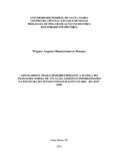| dc.creator | Pompéo, Wagner Augusto Hundertmarck | |
| dc.date.accessioned | 2021-12-14T11:20:21Z | |
| dc.date.available | 2021-12-14T11:20:21Z | |
| dc.date.issued | 2021-07-29 | |
| dc.identifier.uri | http://repositorio.ufsm.br/handle/1/23284 | |
| dc.description.abstract | Despite the significant increase in the volume and quality of research produced in the field of
the social history of labour, with records of greater openness in terms of themes and approaches,
it is found that, especially regarding the period of the Estado Novo (1937-1945), they could not
explain the role played by labor lawyers in the then new Labour Justice. In that regard, this PhD
thesis aims to (re)construct the history of these professionals and their legal work – form of
action, limits and possibilities – throughout this period of political and cultural domination in
which, marked by a strong discourse of giving and protection of labour rights, the State sought
the control of workers. For such, we will analyse consistent primary sources in historical labour
processes currently crowded in the collection of Santa Maria’s Labour Justice Memorial,
through which, in addition to having been able to draw a profile of the plaintiffs, types of
demands and discussions more commonly found, we also identified the professionals of the law
who most commonly defended the employees and employers of the municipality. Professionals
who, as indicated in the conclusions reached, were at the epicentre of the first discussions about
(dis)compliance and (in)effectiveness of the newly established social legislation of the time, a
fact that made them as important as the employees, employers and Judges themselves, given
their fundamental role and contributed to the gradual construction and maturation of the social
legislation of the time. | eng |
| dc.language | por | por |
| dc.publisher | Universidade Federal de Santa Maria | por |
| dc.rights | Attribution-NonCommercial-NoDerivatives 4.0 International | * |
| dc.rights.uri | http://creativecommons.org/licenses/by-nc-nd/4.0/ | * |
| dc.subject | Advogados | por |
| dc.subject | Justiça do trabalho | por |
| dc.subject | Santa Maria | por |
| dc.subject | Lawyers | eng |
| dc.subject | Labour justice | eng |
| dc.title | Advogados e trabalhadores perante a justiça do trabalho: forma de atuação, limites e possibilidades na ditadura do Estado Novo em Santa Maria - RS (1937-1945) | por |
| dc.title.alternative | Lawyers and workers before the labor justice: form of action, limits and possibilities in the dictatorship of the Estano Novo in Santa Maria - RS (1937-1945) | eng |
| dc.type | Tese | por |
| dc.description.resumo | Apesar do aumento significativo do volume e qualidade das pesquisas produzidas no campo da
história social do trabalho, com registros de maior abertura no que toca a temas, abordagens e
enfoques, tem-se que, especialmente quanto ao período do Estado Novo (1937-1945), não
deram conta de explicar por completo o papel desempenhado por advogados e trabalhadores na
então novel Justiça do Trabalho. Nesse sentido, a presente tese objetiva analisar a história
relativa a esses sujeitos, advogados e trabalhadores de Santa Maria (RS), sua forma de atuação,
limites e possibilidades, ao longo desse período de dominação política e cultural em que,
marcado por um forte discurso de doação e proteção dos direitos trabalhistas, o Estado buscava
o “controle” da classe trabalhadora. Inserido na área de concentração “história, poder e cultura”
e linha de pesquisa “cultura, migrações e trabalho” do Programa de Pós-Graduação em História
da Universidade Federal de Santa Maria (UFSM), o trabalho se debruça em fontes primárias
consistentes em processos trabalhistas históricos atualmente lotados no acervo do Memorial da
Justiça do Trabalho de Santa Maria, por meio dos quais, para além de ter sido possível traçar
um perfil dos reclamantes, tipos de demandas e discussões mais corriqueiras havidas,
identificou-se também os profissionais da advocacia que mais comumente defendiam a
empregados e empregadores do município. Profissionais esses que, conforme indicado nas
conclusões alcançadas, encontravam-se no epicentro das primeiras discussões a respeito do
(des) cumprimento e (in) efetividade da recém gestada legislação social da época, fato que os
transformou em sujeitos tão importantes quanto os próprios empregados, empregadores e
Juízes, dado seu papel e auxílio interpretativo da legislação social da época. | por |
| dc.contributor.advisor1 | Konrad, Glaucia Vieira Ramos | |
| dc.contributor.advisor1Lattes | http://lattes.cnpq.br/1194002753412760 | por |
| dc.contributor.referee1 | Lopes, Aristeu Elisandro Machado | |
| dc.contributor.referee2 | Konrad, Diorge Alceno | |
| dc.contributor.referee3 | Gill, Lorena Almeida | |
| dc.contributor.referee4 | Silva, Maria Beatriz Oliveira da | |
| dc.creator.Lattes | http://lattes.cnpq.br/4372023898375205 | por |
| dc.publisher.country | Brasil | por |
| dc.publisher.department | História | por |
| dc.publisher.initials | UFSM | por |
| dc.publisher.program | Programa de Pós-Graduação em História | por |
| dc.subject.cnpq | CNPQ::CIENCIAS HUMANAS::HISTORIA | por |
| dc.publisher.unidade | Centro de Ciências Sociais e Humanas | por |



